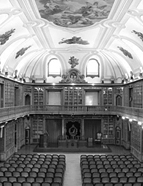

The most enduring publication from this period was História e Memórias, with the publication of several editions. However, it predominantly amalgamated works from members of all three classes and mostly reproduced partial studies rather than comprehensive historical visions. Other renowned collections, such as Efemérides Náuticas and Diário Astronómico [Astronomical Diary] (65 volumes, 1788-1809 and 1820-1862) and the Colecção de Notícias para a História e Geografia das Nações Ultramarinas (7 volumes, 1812-56), enjoyed various literary editors and some degree of longevity—especially the former —though they must still be analysed more closely both in terms of their critical contributions and disciplinary connections in order to better delineate their conception and the place attributed to historical studies. This requires the systematic organisation of the bibliographic and thematic information contained therein and in other significant collections from the period.
Although, from the first C h artism (1826) to the Regeneration (1851), important national and foreign historians emerged who remain crucial references to that period, the ACL neither integrated nor assimilated them through its own initiative unless they were already full members, as was the case for some of the active members of the Portuguese literature class (after 1834, the moral sciences and fine arts class). However, t he issue should not be reduced to a mere demographic explanation. In a country where civil war politicised all sectors of activity (the academic field being no exception), forcing individuals to adopt a clear line of conduct (neutrality was possible but difficult) and to act accordingly, whether by going into exile, going into hiding, accepting public office, or taking up arms, the Academy neither knew nor was able to continue being the nursery for new historians and researchers of historical subjects. By 1833, as Lisbon was taken by liberal troops, the ACL had become a pale shadow of its former golden age. It had become disconnected from its international counterparts, which were likely uninterested in exchanging texts, printed works, and academic degrees with an association representing a country embroiled in a fierce and inhumane civil war. However, d espite the continued efforts of the royal couple, Queen Maria II and King Ferdinand II (who would soon become president of the institution), to restore its former glory by providing a headquarters and material resources so that the ACL could once again devote itself to the study of the sciences, arts, and letters for the national good—according to the programmatic intentions of Correia da Serra—the profound social, ideological, and political fractures that characterised the first half of 19th century Portugal, and particularly the stagnation of projects and methods within the class of moral sciences and fine arts, made it very difficult to revive the historical productivity of earlier times.
